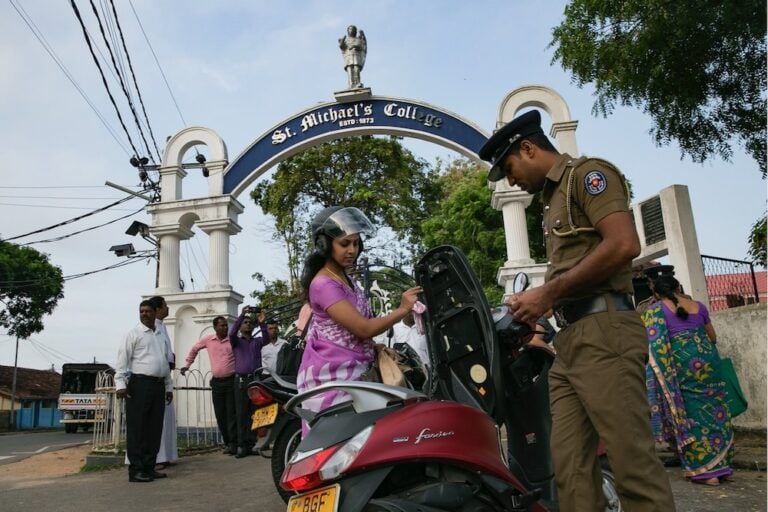(FMM/IFEX) – The following is a 3 September 2004 FMM press release: Sri Lankan Editor and FMM convener wins freedom of expression case in UN The United Nations Human Rights Committee has ruled against the Sri Lanka government in a landmark case on freedom of expression vs. criminal defamation law submitted by Mr. Victor Ivan, […]
(FMM/IFEX) – The following is a 3 September 2004 FMM press release:
Sri Lankan Editor and FMM convener wins freedom of expression case in UN
The United Nations Human Rights Committee has ruled against the Sri Lanka government in a landmark case on freedom of expression vs. criminal defamation law submitted by Mr. Victor Ivan, a senior journalist and the editor of Ravaya weekly newspaper.
Ivan, FMM convener, is a founder and leading member of the movement. FMM congratulates its secretary for his courage and consistency in defending press freedom by taking the case to the UN despite a number of obstacles.
On 26 August 2004, the UN Human Rights Committee determined that, in the case submitted by Ivan, the Sri Lankan state was in violation of protocol under the International Covenant on Civil and Political Rights.
The UN Human Rights Committee has called upon the Sri Lankan government to compensate Ivan, publish this judgment in full and provide a response within 90 days.
The judgment was delivered at the committee’s 81st session, held from 5 to 30 July 2004, when it took up for final consideration the submissions initially made by Attorney Suranjith Hewamanne on behalf of Ivan on 17 December 1999.
Since 1993, Ivan has been indicted a number of times for allegedly having defamed ministers and high level officials of the police and other departments, in articles and reports published in his newspaper. He claimed that these indictments were indiscriminately and arbitrarily transmitted by then Attorney General Sarath Silva to Sri Lanka’s High Court, without proper assessment of the facts as required under Sri Lankan legislation, and that the cases were designed to harass him.
As a result of these prosecutions, Ivan argued that he has been intimidated, his freedom of expression restricted and the publication of his newspaper obstructed.
On 16 February 1998, Ivan applied to the Supreme Court for an order invalidating these indictments, on the ground that they breached Articles 12(1) and 14(1)(a) of the Sri Lankan Constitution, guaranteeing equality before the law and equal protection of the law, and the right to freedom of expression. In the same application, he sought an interim order from the Supreme Court to suspend the indictments, pending the final determination of his application.
On 3 April 1998, the Supreme Court decided that Ivan had not presented a prima facie case that the indictments were discriminatory, arbitrary or unreasonable, and refused him leave to proceed with the application.
Ivan subsequently complained to the Human Rights Committee in Geneva that by transmitting to the High Court indictments charging him with defamation, Attorney General Sarath Silva failed to properly exercise his discretion under statutory guidelines (which require a proper assessment of the facts as required in law for criminal defamation prosecution), and therefore exercised his power arbitrarily.
The judgment now delivered by the UN Human Rights Committee states that by doing so, then Attorney General Sarath Silva violated the author’s freedom of expression under Article 19 of the Covenant, as well as his right to equality and equal protection of the law guaranteed by Article 26.
Sarath Silva is the current chief justice of the Supreme Court in Sri Lanka.
In 2002, the previous government, headed by the United National Party, repealed the Criminal Defamation law as a result of a prolonged campaign by local and international press freedom organizations.
Sunanda Deshapriya
Spokesperson
FMM


